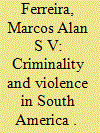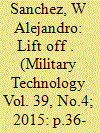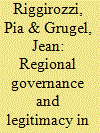| Srl | Item |
| 1 |
ID:
152737


|
|
|
|
|
| Summary/Abstract |
This article aims to present the main challenges related to violence and crime in South America and to analyze how the Union of South American Nations (UNASUR) has responded. A content analysis of the official documents and minutes of three UNASUR councils is presented. The councils examined are the Defense Council, the World Drug Problem Council, and the Council on Citizen Security, Justice and Coordinated Action against Transnational Organized Crime. Notwithstanding its innovative bureaucratic structure, this research suggests that the structures of UNASUR have not kept pace with the growth of violence and crime.
|
|
|
|
|
|
|
|
|
|
|
|
|
|
|
|
| 2 |
ID:
137983


|
|
|
|
|
| Summary/Abstract |
2014 could be remembered as the year when drone usage, both for military and civilian purposes, decisively took off throughout Latin America.
|
|
|
|
|
|
|
|
|
|
|
|
|
|
|
|
| 3 |
ID:
140270


|
|
|
|
|
| Summary/Abstract |
Over the last decade, rapid changes to development models and market rules have led—yet again—to a revision of the meaning of regionalism, bringing to the fore the role of regional organizations in anchoring democracy and supporting progressive social policies. This is particularly the case in South America, where the presence of regional organizations in public policy-making is a subject of increasing scrutiny. This article examines new forms of politically sensitive regional governance in South America, focusing in particular on the case of the Union of South American Nations (UNASUR). It shows how contemporary South American regionalism bypasses the questions of trade and investment that dominated earlier schemes of regionalism in order to focus on shoring up democracy and managing the regional social deficit. The article explores UNASUR's actions in two policy areas: supporting the regional democratic norm and health policy. UNASUR, this article argues, is developing a hybrid form of output-focused legitimacy that rests on a combination of credible commitments to welfare promotion, especially for the poor, and the pursuit of collective public goods, alongside a robust defence of quite minimal but uncontroversial standards of procedural democracy across the region. The analysis challenges the view that regionalism has failed in South America and identifies instead the emergence of a new sort of highly political regionalism. We call for UNASUR to be taken more seriously in the literature on comparative regionalism and, indeed, for a revision of how regionalism more widely is understood in Latin America.
|
|
|
|
|
|
|
|
|
|
|
|
|
|
|
|